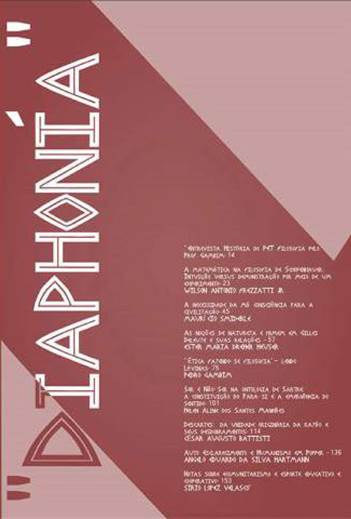The mathematics in the Schopenhauer´s philosophy: Intuition versus demonstration by means of an experiment.
Intuição versus demonstração por meio de um experimento
DOI:
https://doi.org/10.48075/rd.v1i1.10196Keywords:
Conceito. Demonstração. Euclides. Geometria. Intuição. Schopenhauer.Abstract
Schopenhauer puts in opposition two ways to acquire the mathematical knowledge: the intuition against the demonstration. The demonstration is the Euclidean geometrical demonstration or the synthetic method. The intuition (Intuition or Anschauung) refers to the immediate knowledge of the a priori notion of space, ie the pure and a priori intuition of space. For the German philosopher, these two types of knowledge occur through two distinct faculties: the Reason (Vernunft), the creator of the concepts used in the demonstration, and the Understanding (Verstand), related to intuitions. The concepts are transformed forms of the intuitions and therefore less reliable. Thus, Schopenhauer suggests that mathematics should be learned by the use of the intuition and not by the use of the Euclidean demonstrations. Our paper presents this conception of Schopenhauer through the Pythagoras´ theorem. We present the Schopenhauer’s proposal through an mathematical experiment, whose conclusions will be drawn from the reader.
Keywords: Concept. Demonstration. Euclid. Geometry. Intuition. Schopenhauer.
Downloads
Published
How to Cite
Issue
Section
License

This work is licensed under a Creative Commons Attribution-NonCommercial-ShareAlike 4.0 International License.
Aviso de Direito Autoral Creative Commons
Política para Periódicos de Acesso Livre
Autores que publicam nesta revista concordam com os seguintes termos:
1. Autores mantém os direitos autorais e concedem à revista o direito de primeira publicação, com o trabalho simultaneamente licenciado sob a Licença Creative Commons Attribution que permite o compartilhamento do trabalho com reconhecimento da autoria e publicação inicial nesta revista.
2. Autores têm autorização para assumir contratos adicionais separadamente, para distribuição não-exclusiva da versão do trabalho publicada nesta revista (ex.: publicar em repositório institucional ou como capítulo de livro), com reconhecimento de autoria e publicação inicial nesta revista.
3. Autores têm permissão e são estimulados a publicar e distribuir seu trabalho online (ex.: em repositórios institucionais ou na sua página pessoal) a qualquer ponto antes ou durante o processo editorial, já que isso pode gerar alterações produtivas, bem como aumentar o impacto e a citação do trabalho publicado (Veja O Efeito do Acesso Livre).
Licença Creative Commons
Esta obra está licenciada com uma Licença Creative Commons Atribuição-NãoComercial-CompartilhaIgual 4.0 Internacional, o que permite compartilhar, copiar, distribuir, exibir, reproduzir, a totalidade ou partes desde que não tenha objetivo comercial e sejam citados os autores e a fonte.


